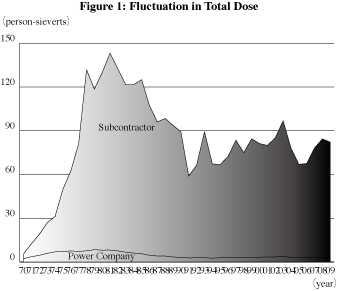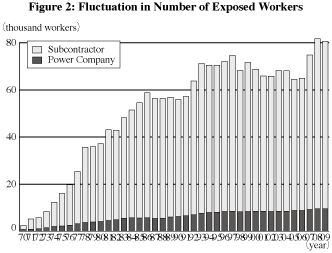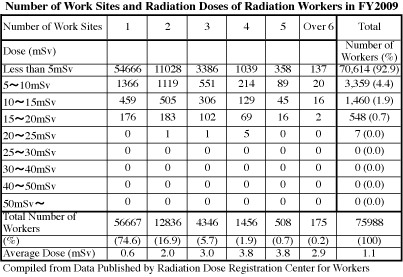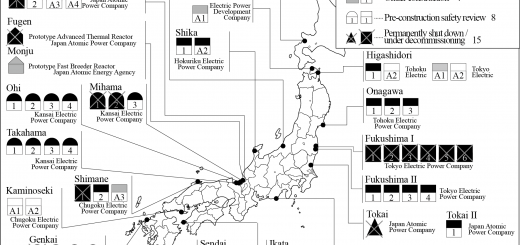Workers’ Radiation Exposure Data for FY2009
On July 29 the Nuclear Industrial and Safety Agency (NISA) released its 2009 Fiscal Year (April 2009 to March 2010) report on radiation exposure incurred by people working at nuclear power facilities. The Japanese report (“Concerning the status of radioactive waste management at nuclear power facilities and radiation dose management of radiation workers”) is available on the following link:
www.meti.go.jp/press/20100729007/20100729007-2.pdf
Figure 1 and Figure 2 below show the fluctuation in worker exposure at commercial nuclear power plants over the past three decades.
The total collective dose in FY2009 for people working at nuclear power plants was 82.08 person sieverts. According to NISA’s report, no one incurred a dose exceeding 20 milli-sieverts. However, according the Radiation Dose Registration Center for Workers (Registration Center) of the Radiation Effects Association, which calculates the total dose received by individuals at all their work places, seven people received doses in the 20-25 milli-sievert range (see table). This compares to just one person in the previous fiscal year. The Registration Center’s figures give a realistic picture of the severe conditions of radiation workers. The true situation is obscured in NISA’s data.
NISA’s data shows a top dose of 19.5 milli-sieverts incurred at the Ohi Nuclear Power Station, while the highest dose for an electric power company employee was 12.9 milli-sieverts at Fukushima I Nuclear Power Station. The highest dose for an electric power company employee in the previous fiscal year was 14.6 milli-sieverts, also at Fukushima I.
For many years CNIC has strongly criticized the lack of legal requirements for the management of radiation workers’ radiation doses. From around 2008, as Japan’s oldest nuclear power plants approached 40 years of operation, finally moves emerged based on the awareness that the absence of adequate legal provisions is an embarrassment for a leading nuclear nation. In particular, radiation exposure of subcontractor workers accounts for over 96% of the total dose incurred in Japan. One cause of the shoddy management of workers’ radiation doses is that in some cases workers do not even receive their radiation control handbook. Management of the radiation doses of subcontractor workers should, therefore, be the top priority.
Mikiko Watanabe (CNIC)




